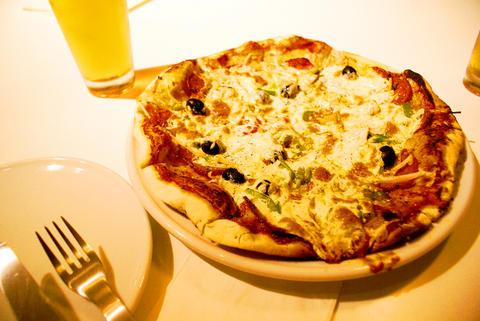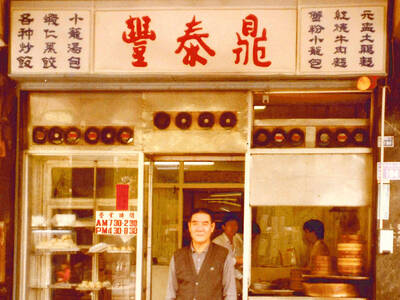Woolloomooloo means "bountiful harvest," or, as Jimmy Yang (楊啟鉉), the laid back proprietor and chef of the cafe bearing the Aboriginal name, says, "Dude, there is a lot of fish here." It's also the name of a recently gentrified area of Sydney, Australia, that features European-style cafes and is the inspiration for the architect's labor of love.
"All architects dream of opening a cafe," said Yang, who lived in Melbourne for 20 years.
Opened six months ago, the cafe is situated on a quiet street close to Taipei Songshan Airport, and a 10-minute walk from the Zhongshan Junior High School (中山國中) MRT station.

PHOTO: NOAH BUCHAN, TAIPEI TIMES
Woolloomooloo has a modern, chic decor. The exposed cement floors and whitewashed walls and wooden tables and shelves are complimented by soft track lighting. Two-thirds of the eating area is given over to two large tables - one square, the other rectangular. Yang has spaced the chairs far enough apart that different parties can dine at the same table without fear of disturbance. On weekends, however, the two tables are often packed with larger parties sipping wine and eating cheese and salami (NT$150 for two up to NT$450 for six).
The other third consists of five two-seater tables and is separated by a standup bar with stools. Large picture windows provide soft natural lighting during the day and glimpses of the tree-lined street.
Apart from the atmosphere, regulars come to sample the limited but mouth-watering menu of drinks and food. There is an emphasis on coffee (NT$100 to NT$150) - the beans are flown in weekly by Tobys Estate, an Australian coffee company - as Yang thinks it's difficult to find a good cup of coffee in Taipei.
"Too often restaurants serve coffee that isn't fresh because it's shipped rather than flown to Taiwan," he said.
Yang stocks a wide range of Australian bottled beers including the popular Crown (NT$200) and a selection of ales by Coopers (NT$150). The wine list is Australian and ranges from NT$1,300 to NT$3,400 per bottle. Glasses of house wine are a bit pricey at NT$230 for the white and NT$250 for the red.
Where he can, Yang makes all his dishes from scratch. The dough used in the pizza is made the day before and is rolled and topped at the time of ordering. His pasta dishes (NT$180 to NT$260) are all made using fresh pasta ordered from a local company, who makes all their pasta using organic semolina flour imported from Australia.
As for the food, the pizza with salami (NT$450) is one of the best in town. It came loaded with mozzarella, fresh slivers of green peppers and onions, whole olives (with the pits) and generous portions of salami. The sauce was rich with tomatoes and spices and the thin crust was cooked so that it was crispy outside.

March 24 to March 30 When Yang Bing-yi (楊秉彝) needed a name for his new cooking oil shop in 1958, he first thought of honoring his previous employer, Heng Tai Fung (恆泰豐). The owner, Wang Yi-fu (王伊夫), had taken care of him over the previous 10 years, shortly after the native of Shanxi Province arrived in Taiwan in 1948 as a penniless 21 year old. His oil supplier was called Din Mei (鼎美), so he simply combined the names. Over the next decade, Yang and his wife Lai Pen-mei (賴盆妹) built up a booming business delivering oil to shops and

The Taipei Times last week reported that the Control Yuan said it had been “left with no choice” but to ask the Constitutional Court to rule on the constitutionality of the central government budget, which left it without a budget. Lost in the outrage over the cuts to defense and to the Constitutional Court were the cuts to the Control Yuan, whose operating budget was slashed by 96 percent. It is unable even to pay its utility bills, and in the press conference it convened on the issue, said that its department directors were paying out of pocket for gasoline

On March 13 President William Lai (賴清德) gave a national security speech noting the 20th year since the passing of China’s Anti-Secession Law (反分裂國家法) in March 2005 that laid the legal groundwork for an invasion of Taiwan. That law, and other subsequent ones, are merely political theater created by the Chinese Communist Party (CCP) to have something to point to so they can claim “we have to do it, it is the law.” The president’s speech was somber and said: “By its actions, China already satisfies the definition of a ‘foreign hostile force’ as provided in the Anti-Infiltration Act, which unlike

Mirror mirror on the wall, what’s the fairest Disney live-action remake of them all? Wait, mirror. Hold on a second. Maybe choosing from the likes of Alice in Wonderland (2010), Mulan (2020) and The Lion King (2019) isn’t such a good idea. Mirror, on second thought, what’s on Netflix? Even the most devoted fans would have to acknowledge that these have not been the most illustrious illustrations of Disney magic. At their best (Pete’s Dragon? Cinderella?) they breathe life into old classics that could use a little updating. At their worst, well, blue Will Smith. Given the rapacious rate of remakes in modern